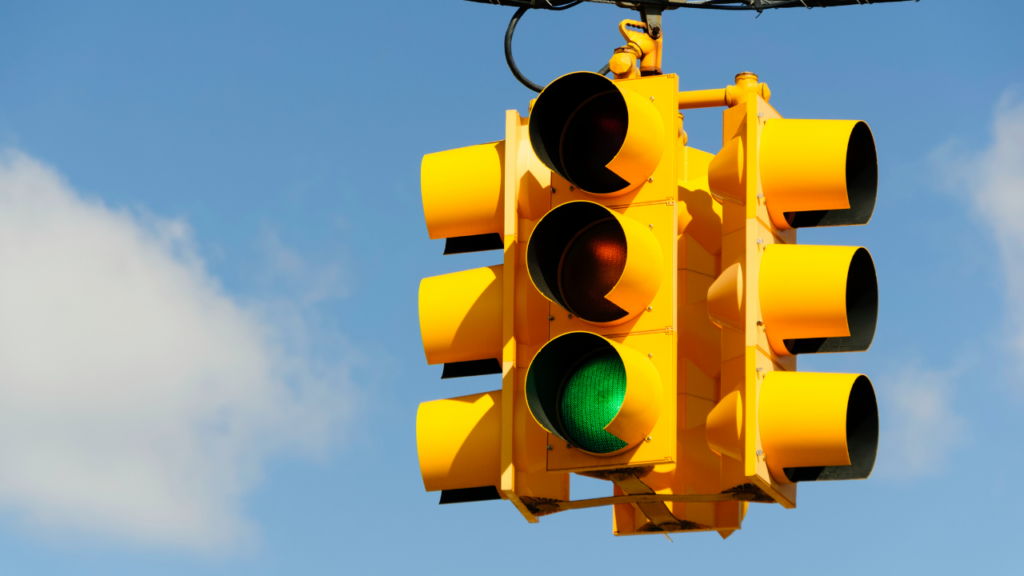
A failure to observe a traffic signal in New Jersey can result in a costly fine and in higher insurance premiums. It also goes on your driving record, which could impact potential employment opportunities. If you have been accused of failure to observe a traffic signal in New Jersey, you should seek the advice of an experienced traffic ticket attorney, who can try to get the charges dismissed or reduced.
It is important to understand the financial and legal consequences of failing to observe a traffic signal in New Jersey. While you could just pay the ticket, this may not be the best course of action. The goal of this article is to make our potential clients aware of what failing to observe a traffic signal can mean.
Understanding New Jersey Traffic Laws Regarding Traffic Signals
There are several NJ statutes that deal with traffic signals.
- Section 39:4-81 states that every driver must obey traffic control signals. When a signal is nonfunctional, the rules for stop sign intersections apply.
- Section 39:4-66.2 states that it is illegal to avoid a traffic signal by detouring through public or private property, even with permission from the owner.
- Section 39:4-105 explains the color system for traffic signals that we are all familiar with (green means to proceed through the intersection, and red means to stop). It is permissible to proceed through a yellow light if it is unreasonable to stop safely. The law defines a safe stopping distance as 50 feet at 20 miles per hour.
In short, the definition of failure to observe a traffic signal is failing to stop at a red light, or failing to stop at a yellow light when there is sufficient stopping distance at the time the light turns yellow. Avoiding a traffic signal is a separate charge.
Consequences of Failing to Observe a Traffic Signal
According to Section 39:4-203, the penalty for failing to observe a traffic signal in New Jersey is a fine of $50-$200 and/or imprisonment of up to 15 days.
In New Jersey, a driver gets two points on their license for failing to observe a traffic signal. Once a driver accumulates 12 or more points, they face a license suspension.
These points also affect insurance rates. According to Value Penguin, failing to observe a traffic signal results in an average increase of $0.28 on the dollar. For example, if someone’s annual premium was $1,000, it would increase to $1,280.
Finally, if an accident is caused by failure to observe a traffic signal, it could open up the driver to civil liability. This can mean driver’s license points, insurance increases, and out-of-pocket payments to injured parties.
Factors Contributing to Failure to Observe a Traffic Signal
There are many factors that can contribute to the failure to observe traffic signals. Distracted driving is the most common reason for this violation. Distracted driving includes doing anything other than driving, including eating. However, using a mobile device while driving is the only type of distracted driving that is illegal.
Impaired driving is another factor in some failures to observe traffic signals. Driving under the influence of drugs or alcohol is illegal. However, some medications can also cause impaired driving, sometimes without the full awareness of the person taking them.
Misinterpretation of a signal or visibility issues can also lead to failures to obey traffic signs and signals. It is every driver’s responsibility to know what traffic signals mean. That said, one cannot be expected to obey a traffic signal that is not visible because it is obstructed. Drivers do have a responsibility to proceed with caution through an intersection where the traffic signal is not visible.

Need help with your speeding ticket?
Call Now - We've Fought Over 100,000 Traffic Violations
Quick, free, and no obligation.
Legal Defenses Against Accusations of Failure to Observe a Traffic Signal
The best legal defense when accused of failing to observe a traffic signal depends on the circumstances. It may be possible to challenge the evidence or testimony presented by law enforcement, such as if the officer was not in a position to clearly see whether the defendant actually failed to observe a signal.
It may also be possible to argue necessity or emergency circumstances. For example, the driver could be on their way to the emergency room for a serious medical issue. Mechanical failure can also constitute necessity in some cases.
The best legal defense against failure to observe a traffic signal in New Jersey is to demonstrate compliance with traffic laws. If the driver was in the intersection before the light turned red, was driving the speed limit, and did not have the safe distance to stop (if the light was yellow), they would be complying with traffic laws.
How an Attorney Can Assist Someone Accused of Failing to Observe a Traffic Signal in New Jersey
An attorney can assist someone accused of failing to observe a traffic signal in New Jersey in a number of ways. Gathering evidence and witness testimony is important, and an experienced attorney knows what questions to ask of witnesses. The attorney can also develop a defense strategy tailored to the specific circumstances of the case.
In some cases, an attorney can negotiate with prosecutors for reduced charges or penalties. This might require a period of probation or enrollment in the Remedial Driver Education Program, which comes with additional costs. An attorney will also represent the accused in court proceedings if necessary, fighting to get charges dismissed or reduced. Finally, the attorney will advise their client on potential consequences and mitigating factors.
FAQs
Is there any way to get points removed from my license for failure to observe a traffic signal in New Jersey?
If you do not commit a moving violation or receive a suspension for 12 consecutive months following your citation for failure to observe a traffic signal, three points will be removed from your license. In addition: (1) successfully completing a MVC Driver Improvement Program will result in three points being credited back to your license; (2) completing a Defensive Driving Program will result in a two point credit; and (3) completing a Probationary Driver Program will result a three point credit.
How much is a ticket for failure to observe a traffic signal in New Jersey?
The fine ranges from $50 to $200. The court sets the fine based on the facts of the case and the driver’s history.
How long do points stay on your license in New Jersey?
Points stay on your license indefinitely. Taking a course, for example, does not remove or erase points. They are still visible to the courts and your insurance company. This is why it is important to fight the failure to observe a traffic signal charges in court.
Can I just pay my ticket and not go to court for failure to observe a traffic signal?
You may be able to pay the fine and not go to court if you fail to observe a traffic signal. However, doing so means that you are pleading guilty, which results in points on your license. If the ticket has “court appearance required” checked, you must go to court even if you plan on pleading guilty.
What happens if I miss court for failure to observe a traffic signal?
If you miss court and do not pay the fine, a warrant will likely be issued for your arrest. You may also lose your driving privileges.
Can I make a payment plan for traffic tickets in New Jersey?
Yes, you may be able to make a payment plan for traffic tickets in New Jersey. A financial questionnaire may be required to prove to the judge that you need time to pay and that you are able to stick to the payment plan.
Call a Rosenblum Law Traffic Attorney Today
If you have been accused of failure to observe a traffic signal in New Jersey, contact a Rosenblum Law traffic attorney today at 973-750-9556 for a consultation. As discussed, the financial and legal consequences of this traffic violation can be substantial. It is necessary to have legal representation in navigating accusations of failure to observe traffic signals to protect your driving record and your pocketbook.
Rosenblum Law has years of experience in traffic matters. Our traffic ticket attorneys can help you avoid some or all of the penalties if you are accused of failing to observe a traffic signal. In the meantime, take your awareness of the law from this guide with you on the road for a safer driving experience.


